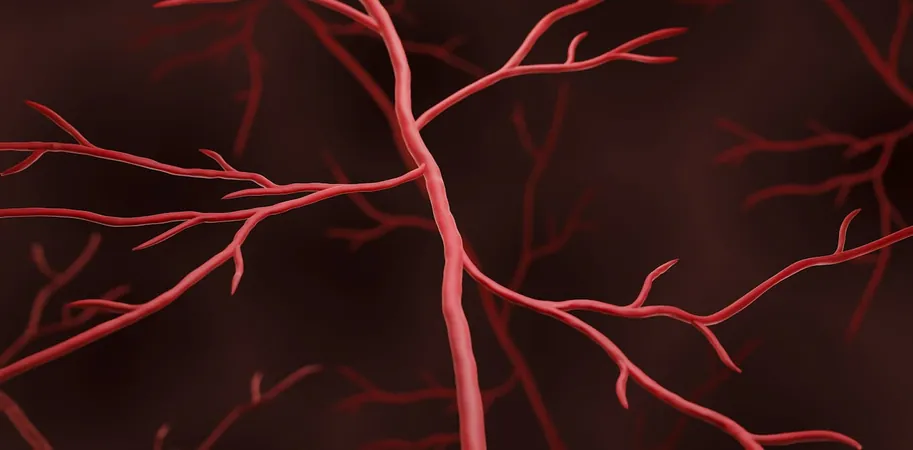
Breakthrough Study Reveals How Cancer Weakens Muscles—And What We Can Do About It!
2025-07-11
Author: Mei
The Shocking Connection Between Cancer and Muscle Weakness
In a groundbreaking study published in Nature Cancer, researchers have unveiled a startling truth: tumors can devastate blood vessels associated with muscles, even if the muscle tissues are far removed from the tumor itself. This research sheds light on the troubling issue of muscle loss among cancer survivors and seeks to unravel the mysteries behind it.
Understanding the Impact of Tumors on Muscle Health
Cancer-related muscle loss is a monumental challenge for patients, but pinpointing the exact mechanisms at play has been tricky. Researchers nurtured a hypothesis that cancer may damage the vital blood vessels responsible for delivering life-sustaining nutrients and oxygen to the muscles. Healthy blood vessels are crucial; they transport oxygen-rich blood throughout the body, while unhealthy vessels lead to nutrient shortages and, ultimately, muscle weakness.
Revolutionary Findings from Cutting-Edge Research
To investigate this theory, the research team utilized a range of animal models affected by different types of cancer, including lung, skin, colon, and pancreatic. Remarkably, they discovered that blood vessel damage in muscle tissues occurred long before any visible muscle weakness was noted.
Key to this dysfunction was a protein secreted by tumors known as Activin-A, which significantly contributed to the leakage and deterioration of blood vessels in muscle tissues. In a breakthrough intervention, scientists employed gene therapy to counteract the detrimental effects of Activin-A, managing to stave off muscle loss effectively.
The Reality of Muscle Weakness Post-Cancer
Many cancer survivors struggle with profound muscle weakness, often finding simple tasks like climbing stairs or grocery shopping immensely challenging. This severe condition, known as cancer cachexia, affects nearly 80% of patients with advanced stages of the disease, and research suggests that muscle weakness is even more prevalent than previously believed.
A staggering portion of new cancer patients show symptoms of muscle weakness upon their first consultation, and what’s worse, cachexia can haunt survivors even after successful treatment, significantly diminishing their quality of life.
A New Approach to Combat Cachexia?
The findings from this research highlight an intriguing possibility: enhancing blood vessel function in muscles might provide a new avenue for preventing or reversing cachexia. While the causes of muscle loss in cancer are multifaceted—often involving poor nutrition, persistent inflammation, and loss of appetite—addressing blood vessel health may be a critical component of treatment.
The Future of Treatment
Currently, the FDA has not approved any treatments specifically for cachexia, but promising new therapies are emerging. One breakthrough involves a monoclonal antibody targeting GDF-15, a protein known to inhibit appetite.
Other innovative approaches include combining targeted nutritional support and exercise regimens to help patients regain muscle mass and strength.
Moving Forward: A Holistic Approach to Cancer Care
As the research progresses, scientists are now evaluating existing drugs and exercise therapies aimed at improving blood vessel health, potentially providing swift assistance to cancer patients seeking to restore muscle strength. The ultimate goal is to emphasize the necessity of comprehensive medical care for cancer patients, encapsulating cardiovascular health and overall well-being.




 Brasil (PT)
Brasil (PT)
 Canada (EN)
Canada (EN)
 Chile (ES)
Chile (ES)
 Česko (CS)
Česko (CS)
 대한민국 (KO)
대한민국 (KO)
 España (ES)
España (ES)
 France (FR)
France (FR)
 Hong Kong (EN)
Hong Kong (EN)
 Italia (IT)
Italia (IT)
 日本 (JA)
日本 (JA)
 Magyarország (HU)
Magyarország (HU)
 Norge (NO)
Norge (NO)
 Polska (PL)
Polska (PL)
 Schweiz (DE)
Schweiz (DE)
 Singapore (EN)
Singapore (EN)
 Sverige (SV)
Sverige (SV)
 Suomi (FI)
Suomi (FI)
 Türkiye (TR)
Türkiye (TR)
 الإمارات العربية المتحدة (AR)
الإمارات العربية المتحدة (AR)